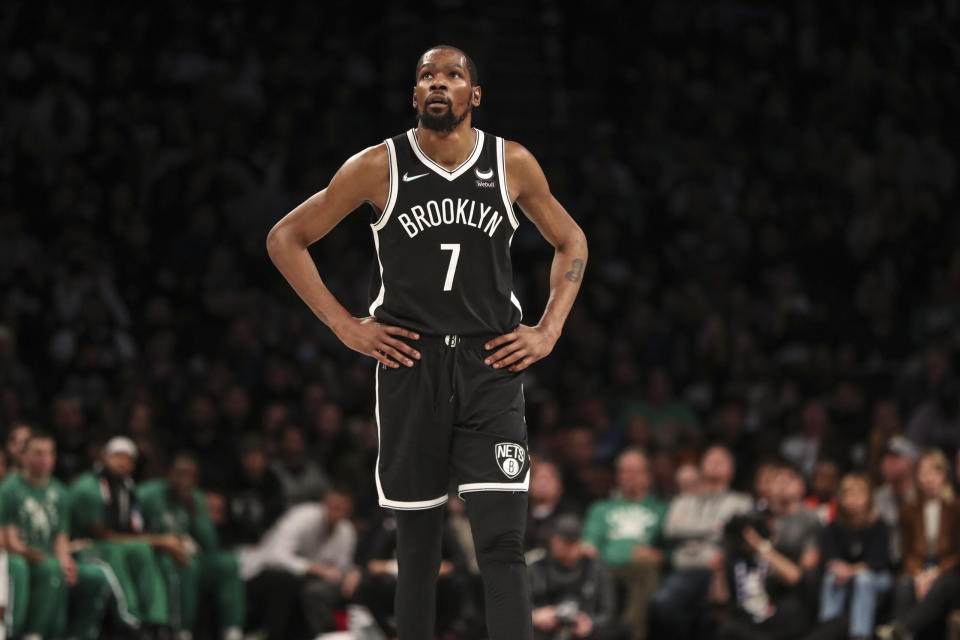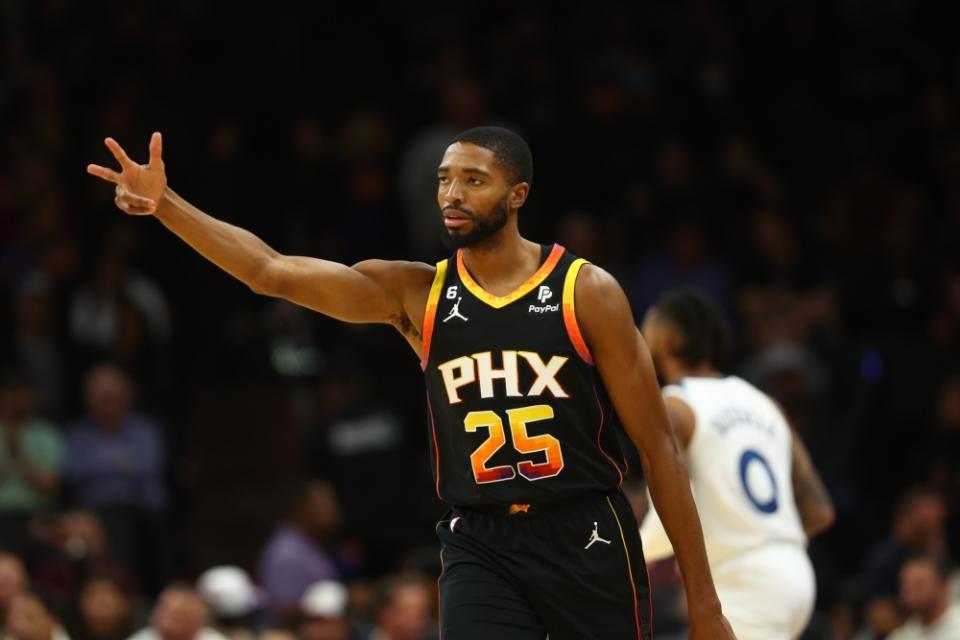Kevin Durant trade: How it impacts Suns and Nets

When the Nets traded James Harden to the Sixers at last year’s deadline, it felt like the pinnacle of crazy trade deadlines. Well… this year’s deadline has already featured two star players getting moved by the same team, including one of the greatest players to ever be traded mid-season.
In what was a shocking development, the Brooklyn Nets are moving Kevin Durant to the Phoenix Suns for Mikal Bridges, Cameron Johnson, Jae Crowder, four first-round picks, and a first-round pick swap.
Here is an analysis of the trade and how it impacts both teams.
How it impacts the Suns

Mark J. Rebilas-USA TODAY Sports
The foundation for making a big trade like this has been apparent for a while. Rumblings of Durant’s interest in playing for the Suns dated back to when he originally made his trade request last offseason. Phoenix had all their own first-round picks going forward and enough matching salary on the roster to trade for just about anyone. The Nets just needed a nudge to trade him while the Suns got a big one to execute it.
It was unclear if the Suns would be willing to make a big deal of any kind in the middle of an ownership transition. However, that appeared to change when it was reported that new majority owner Matt Ishbia would be on track to officially take over on February 8, one day before the deadline. And on his first day, Ishbia wasted no time.
The four first-round picks the Suns traded represented the maximum amount they could possibly move right now. The Suns are trading unprotected firsts in 2023, 2025, 2027, and 2029, as well as a first-round pick swap in 2028. This felt like an inevitable cost thanks to the Utah Jazz establishing that going rate for All-Stars right now.
What really put their offer over the top was likely the addition of Bridges. When Durant was on the trade market last offseason, one popular framework included the Suns trading Deandre Ayton in a sign-and-trade to a maximum contract. Whether he went to Brooklyn or a third team, he would’ve served as a significant portion of the matching salary needed along with Johnson and Crowder. Instead, the All-Defensive forward, who would’ve been an awesome fit next to Durant, is headed out.
Phoenix made their big move and traded just about all their most valuable assets in the process. Unless they plan on moving Ayton or Chris Paul, who himself has been mentioned in trade rumors, any deal they do will be marginal. They still have several moveable salaries in Dario Saric, Landry Shamet, Cameron Payne, and Torrey Craig they can trade and have seven second-round picks to play with.
The Suns were already projected to be a luxury tax team going forward, but this deal requires a deep commitment to spend. Durant is owed $150 million over the next three seasons while Devin Booker’s newly signed four-year, $224 million supermax extension isn’t set to kick in until 2024-25. This deal will increase their luxury tax penalty for this season by $35 million and payroll and tax combination by $45 million. In total, their tax bill is set at $68.7 million for a $245 million roster. They project to have the third most expensive roster in the league after the Warriors and Clippers once they fill their newly opened roster spot.
How it impacts the Nets

Mark J. Rebilas-USA TODAY Sports
After finally trading Kyrie Irving last weekend, it felt like a matter of time before speculation on Durant’s future in Brooklyn would begin. The timing may have been the most surprising part considering the return for Irving featured two productive win-now veterans in Spencer Dinwiddie and Dorian Finney-Smith. Clearly, negotiations between the two teams from last offseason carried over into the trade deadline, allowing both teams to agree to such a massive deal rather quickly.
It felt like Durant trade talks would be shelved until the offseason, but with the most optimal package they could get presented from Phoenix available to them, they had to pull the trigger now. The Nets now have 11 first-round picks over the next seven drafts, setting them up nicely for a potential rebuild. They go from being one of the most constrained and expensive teams to one of the more flexible and asset-rich in the league.
Or, if the organization isn’t patient enough for that, they could look to package those picks for new All-Stars later. The roster is probably too strong to bottom out for a high lottery pick in this year’s draft, but they also can’t exactly bottom out in the short term since they still owe two first-round picks and three first-round pick swaps to the Houston Rockets. This could factor into a decision to remain competitive and flip their assets into an All-Star in the near future.
The Nets now have a ton of overall really good-to-great players on the roster, many of which could be part of the next great Nets team or help another playoff team now. A lot of these players also hold a lot of trade value themselves and could return first-round draft compensation should the Nets decide to sell more. In this insane market, they could get a strong package for any of Bridges, Johnson, Finney-Smith, or Royce O’Neale.
The decreased pressure to win now could afford them to be more patient with Ben Simmons, but he could be a name to keep an eye on in regard to their finances. At the beginning of the week, the Suns had a $108 million luxury tax and $293 million roster. After trading Irving, Durant, and Kessler Edwards, they’ve lowered their tax bill all the way down to $35.5 million and the roster down to $203 million, giving them a total savings of $90 million. They would need to clear an additional $17.1 million by the end of the day if they want to completely get out of the luxury tax.
The tax implications are more substantial starting next year. They still have a salary dump or two to make to remain under the tax next season while re-signing Johnson, but the pathway is within reach. After spending what will be three consecutive years in the luxury tax, the Nets are set to enter the repeater tax. Keeping Durant and re-signing Irving to a salary at his current amount would’ve put Brooklyn’s expenses in the $350-plus million range annually. It’s crazy to think that just less than two years ago, the Nets were hoping to extend both Irving and Harden to maximum extensions and pay astronomical roster expenses.
With the way the deal is currently structured, the Nets would generate two trade exceptions worth $8 million and $1.8 million. There’s potential for this trade to be expanded into a three-way, particularly to try to find a new home for Crowder. If he isn’t rerouted by the end of the trade deadline, he seems like a logical buyout candidate.
You can follow Yossi Gozlan (@YossiGozlan) on Twitter.
[listicle id=1901813]
[listicle id=1901575]
[listicle id=1901165]

